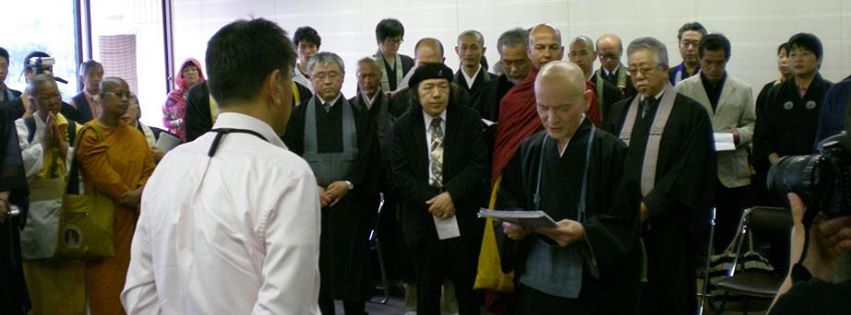by Member of the Bureau, Pastor Naito Shingo

|
Representation against restart of the Ohi Nuclear Power Plant at Fukui prefectural government office on May 30, 2012.
|
The Organization of Religious People Questioning the Nuclear
Energy Administration is a national network of religious leaders
(Buddhist, Christian, Shinto, etc.) around the country concerned about
the national policy on atomic energy. In 1993, when the Monju fast
breeder reactor first came close to criticality, religious leaders in
Tsuruga, Fukui Prefecture, gathered together and set up the
organization.
From the formation onwards, we have not appointed a
representative; instead decision-making is carried out and the
organization run through the consensus of 40 persons from around the
country in the Facilitators’ Meeting. Four persons in the bureau are
mostly dealing with the daily office work. We send our newsletter
to around 800 persons. The Facilitators’ Meeting takes place about
twice a year. Furthermore, irregularly, but once every one to two
years, we organize a national meeting, usually close to the location of
a nuclear power plant. For the purpose of fighting together, we want to
deepen our interactions with citizens groups around the whole country.
Until now, we have made representations to operators
and municipalities in regard to several locations with nuclear power
plants, the reprocessing plant in Rokkasho, Aomori Prefecture, or the
fast breeder reactor Monju. Furthermore, we repeatedly make
representations, not only to municipalities hosting nuclear power
plants but also to the state.
On our side, Buddhist monks, Christian priests and
leaders of other religions list their names together and gather in
different religious attire. Therefore, when we make representations to
the state, it seems as if the government is considerably worried. When
movement groups around the country make individual representations, the
officials coming to hear their plea are normally around two to four
persons. However, only because it was a representation of religious
leaders, when we arrived with ten persons, the other side gathered
together 22 officials including people from the Cabinet Office, MITI
(Ministry of Economy, Trade and Industry), MEXT (Ministry of Education,
Culture, Sports, Science and Technology) or the Foreign Ministry to
defend while showing extreme stress at our questions and opinions (1st
October 2008). I think that they are afraid that the religious world
will rise up against them. However, I think that in general the
religious world in the country has little interest in topics such as
this, despite the heavy responsibility that it bears.
After the nuclear accident in Fukushima, beyond the
representation actions, we are putting a lot of effort into a child
recreation project. In relation to this, we are also making
representations to the state and prefectures. As an urgent issue, I
feel that beginning with Fukushima, the evacuation and recreation of
children in areas with high radiation doses is necessary. Since the
accident, we have organized the “Hokkaido Temple School Camp” each
summer, and every year around 200 children and 100 guardians come
together for around ten days in about 30 temples in Hokkaido. We offer
a space where at least for a little while the children can recover
their immune strength, and the costs such as travel expenses are
covered by fundraising around the country. If you would like to know
more about the content and actions of our organization, please take a
look at our
homepage when you have the opportunity (only in Japanese)*.

